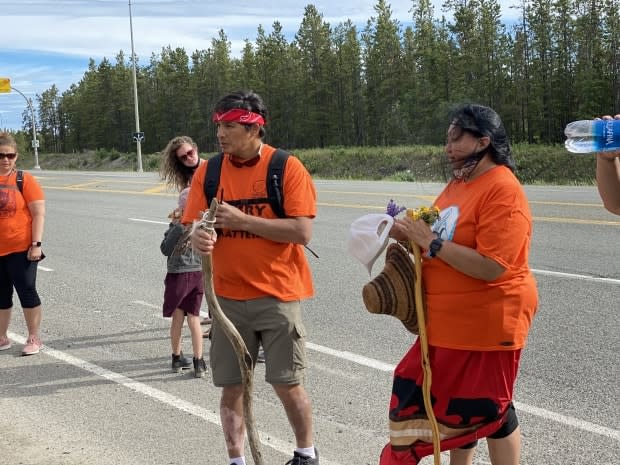Grueling walk to Kamloops 'heavy, but very important,' say Yukoners halfway through journey

A group of Yukoners walking from Whitehorse to Kamloops, B.C., in honour of Indigenous children who died at residential schools is now about halfway through their journey.
Undaunted by the heat and by long days on the road, the group of walkers has expanded since leaving Whitehorse on June 27, and now comprises about 14 people.
"We've had the opportunities to meet with the communities along the way, and that has been incredibly beautiful and healing," said Jacqueline Shorty in an interview on Yukon Morning with host Elyn Jones on Thursday.
Shorty and James Henyu came up with the idea for the walk, which has been named the Warriors Walk for Healing Nations, in mid-June — just weeks after the Tk'emlúps te Secwépemc First Nation in B.C. revealed that preliminary findings at the former Kamloops Indian Residential School uncovered the remains of 215 children buried at the site.
In the weeks since, other First Nations have announced similar discoveries on former residential school sites.
"It's been really heavy, but very important work," Shorty said of the walk. "With every community that we visit we do a prayer circle... All of the communities have come out and walked for us."
Along with the mental and emotional toll, there's a physical one as well, she said.
"The heat has been something else," said Shorty, describing sunburns, heat exhaustion, and efforts to stay hydrated under the beating sun.
'We're not big fitness buffs'
To conserve energy, the group has been using a method called caterpillar or leapfrog walking, where they split into teams to cover 10-kilometre sections.
Even still, she said they were in need of a break as they approached Terrace, B.C., with plans to rest for several days and recover their strength.
"We're not big fitness buffs," said Shorty. "We're just grandparents, and children of survivors."
She says that each of the walkers has a person or people they think of to find strength.
For Shorty, it's her mother Emma.
"My mother attended residential school," said Shorty. "I think about my mother walking from Carcross to Teslin, because she had to do that to go home for the summer."
She says many children had no choice but to walk to get back to their own communities — and some never made it.
"I think about the sacrifice they made, the hope that they had that they would make it home," she said.
Shorty says the group's goal is to arrive in Kamloops by about August 10.
Support is available for anyone affected by the effects of residential schools, and those who are triggered by the latest reports.
The Indian Residential School Survivors Society (IRSSS) can be contacted toll-free at 1-800-721-0066.
A national Indian Residential School Crisis Line has been set up to provide support for former students and those affected. People can access emotional and crisis referral services by calling the 24-hour national crisis line: 1-866-925-4419.
The NWT Help Line offers free support to residents of the Northwest Territories, 24 hours a day, 7 days a week. It is 100% free and confidential. The NWT Help Line also has an option for follow-up calls. Residents can call the help line at 1-800-661-0844.
In Nunavut, the Kamatsiaqtut Help Line is open 24 hours a day at 1-800-265-3333. People are invited to call for any reason.
In Yukon, mental health services are available to those in both Whitehorse and in rural Yukon communities through Mental Wellness and Substance Use Services. Yukoners can schedule Rapid Access Counselling supports in Whitehorse and all MWSU community hubs by calling 1-867-456-3838.
Do you have information about unmarked graves, children who never came home or residential school staff and operations? Email your tips to CBC's new Indigenous-led team investigating residential schools: WhereAreThey@cbc.ca.

